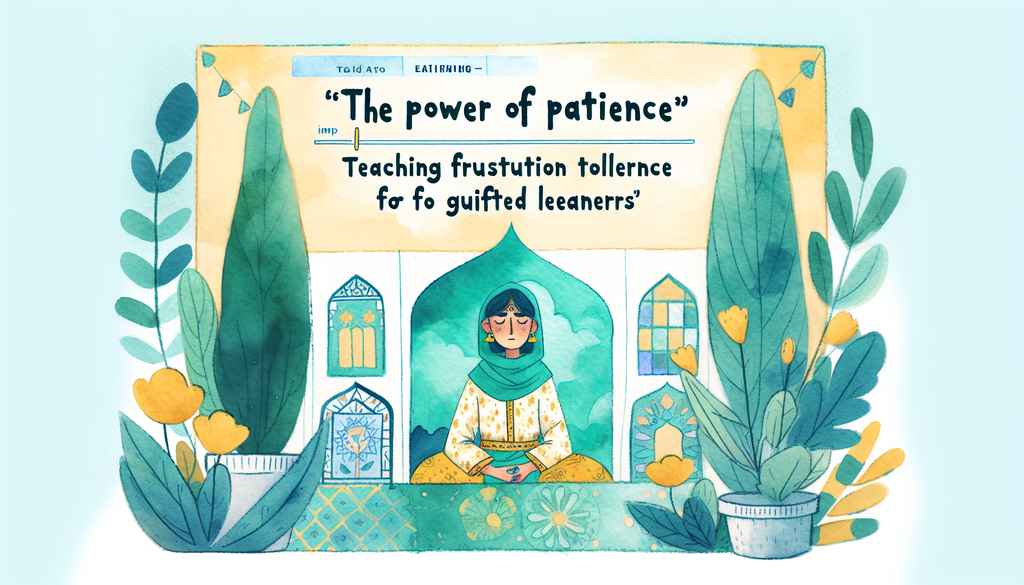The Power of Patience: Teaching Frustration Tolerance to Gifted Learners

The Power of Patience: Teaching Frustration Tolerance to Gifted Learners
Gifted learners, while known for their remarkable cognitive abilities, often face unique emotional challenges. One such difficulty is frustration intolerance, a common hang-up among the gifted population. This blog post aims to provide parents and educators with strategies to foster patience and resilience in gifted learners.
Gifted children may often find themselves encountering frustration for various reasons. They operate at a different pace, mentally outstripping their chronological age or conventional teaching methods. The disconnect between these gifted children’s mental abilities and their environment might result in impatient behavior when scheduled activities or rules don’t align with their expectations.
What is Frustration Intolerance?
Frustration Intolerance (FT) is a term used in psychology to describe individuals who find it particularly challenging to tolerate frustrating situations. It can manifest as impatience, sudden anger, or giving up on tasks that don’t offer an immediate reward or meet their high standards. Such behavior, when left unaddressed, can hinder both academic achievements and fulfillment in personal life.
Addressing FT, especially in the context of gifted learners, requires a nuanced approach. You can read more about this perspective on the gifted learners and their emotional sensitivity in our previous post.
Strategies to Build Frustration Tolerance
1. Emphasize Effort Over Results
Often, gifted children hold themselves to high standards. If they don’t succeed in their first attempt, it may cause significant frustration and an unwillingness to pursue the goal further. An effective way to address this issue is to shift the focus from the result to the process and effort. Celebrate attempts and development, fostering a love for learning and perseverance rather than a mere thirst for victory. For more tips on reinforcing this positive development, check our post on recognizing milestones for children with special needs.
2. Facilitate Problem-Solving
Gifted learners thrive on challenges, and their cognitive ability allows them to grasp intricate concepts quickly. Engage them in problem-solving activities that are complex and require time and effort. This not only satiates their curiosity but helps them become more tolerant of extended periods of concentration and effort. Problem-based learning makes an excellent strategy for this!
3. Encourage Emotional Expression
Many gifted learners struggle with expressing their emotions, which piles up their frustration and may even lead to emotional outbursts. Encouraging emotional expression goes a long way in helping these children better understand their feelings and develop coping strategies. Ventura and Ehri’s “Mental and Emotional Tool Kit” can serve as a valuable resource for this.
4. Practice Mindfulness and Meditation
Mindfulness and meditation can be a favorable approach to teach patience to gifted learners. It prompts children to calm their minds, focus on the present moment, and handle their emotions better. This practice not only aids in managing frustration but also improves focus and attention.
5. Provide Mentorship
As gifted learners’ cognitive abilities exceed their age level, they may feel isolated or misunderstood by their peers. This situation can often lead to frustration. Providing these learners with a mentor who understands their capabilities and challenges can greatly help. For more information, please see our article on the impact of mentors on gifted youths.
In conclusion, developing frustration tolerance doesn’t happen overnight. It requires patience in itself, constant support, and fit interventions. Remember, gifted learners are gifted in multiple ways, including their capacity to learn these coping skills quicker and more efficiently than other children. With the right guidance, these learners can use their frustration as a catalyst for personal and academic growth, harnessing the power of patience in all things they do.